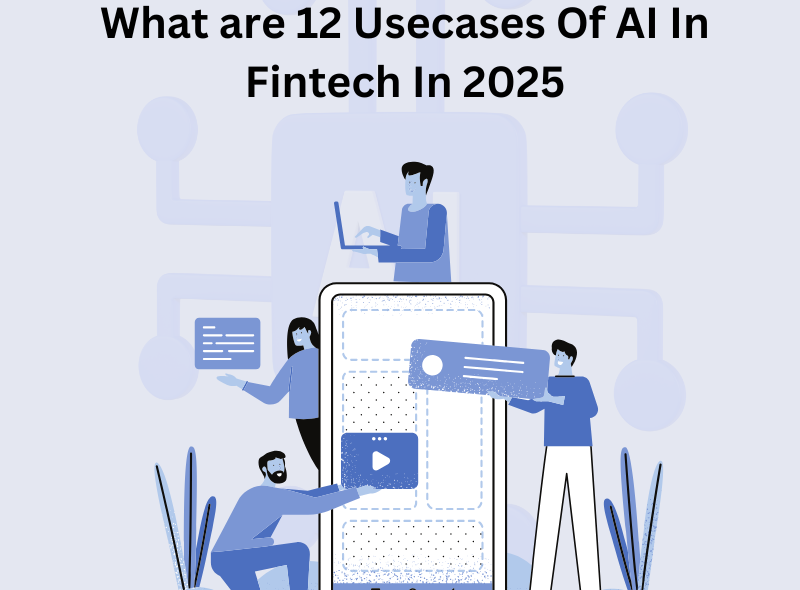The intersection of Artificial Intelligence (AI) and Financial Technology (FinTech) has dramatically transformed the way financial services are delivered and experienced. As we move into 2025, AI’s role in FinTech is continuing to evolve, opening up new possibilities and creating innovative solutions. In this blog, we’ll explore how AI is shaping the future of FinTech and the opportunities it brings, and highlight some exciting use cases that are revolutionizing the financial services industry.
What is AI in Fintech?
AI in FinTech is the use of Artificial Intelligence to improve and streamline financial services. By applying technologies like machine learning and data analysis, AI helps financial companies automate tasks such as detecting fraud, assessing risk, managing investments, and providing customer support. It can analyze large amounts of data quickly, helping businesses make better decisions. AI in FinTech also powers tools like chatbots and robo-advisors, offering personalized financial advice and improving customer experiences.
AI is making a big impact on the FinTech industry by improving how financial services work, making them faster, more efficient, and more personalized. Here’s a breakdown of 12 ways AI is transforming FinTech:
1. Fraud Detection and Prevention
AI helps financial institutions spot fraudulent activity in real time by analyzing spending patterns and transaction data. It can quickly flag suspicious behavior, such as unusual purchases or account access, and stop fraud before it happens.
2. Risk Assessment and Credit Scoring
AI looks beyond traditional credit scores to assess a person’s financial health. It can analyze things like spending habits, social media activity, and transaction history to provide a more accurate credit score, helping people who may not have a long credit history.
3. Algorithmic Trading
AI algorithms can analyze massive amounts of market data and find trading opportunities much faster than humans can. These algorithms help investors make smarter decisions by automatically buying and selling based on real-time data, improving trading efficiency.
4. Robo-Advisors
AI-powered robo-advisors give people automated, personalized investment advice. By analyzing your financial goals and risk tolerance, they create investment portfolios tailored just for you. Robo-advisors make investing more affordable and accessible to a wider range of people.
5. Personalized Banking Services
Banks are using AI to offer services that are tailored to each customer. By looking at your spending habits and financial goals, AI can recommend the best products for you—whether it’s a savings account, loan, or investment opportunity.
6. Chatbots and Virtual Assistants
AI-powered chatbots handle customer service tasks like answering questions, helping with transactions, or providing financial advice. They are available 24/7, reducing wait times and offering quicker, more efficient support.
7. Anti-Money Laundering (AML) Compliance
AI helps banks and financial institutions comply with anti-money laundering regulations by spotting suspicious transactions. AI can flag unusual patterns, like large transfers or rapid movement of money, helping institutions prevent money laundering.
8. Customer Insights and Predictive Analytics
AI analyzes customer behavior and predicts future needs. For example, AI can help banks predict when you might need a loan or suggest relevant financial products before you even ask. This helps make services more timely and personalized.
9. Insurance Underwriting
In insurance, AI speeds up the underwriting process by looking at data from various sources, like medical records and driving history, to assess risk more accurately. This results in faster approval and more tailored insurance plans for customers.
10. Loan Underwriting and Approval
AI makes loan approvals faster and more accurate. By looking at more than just your credit score—such as your spending habits and transaction history—it can determine your creditworthiness, leading to quicker decisions and better loan offers.
11. Payment Fraud Prevention
AI is used to monitor transactions and prevent payment fraud. By analyzing purchasing behavior, AI can quickly detect if something seems off, like a sudden spike in spending or unusual locations. This helps stop fraud while making sure legitimate payments go through.
12. Financial Forecasting
AI helps businesses and financial institutions predict market trends and economic conditions. By analyzing past data and current trends, AI can provide forecasts that help with budgeting, investment planning, and long-term financial decisions.
Conclusion
As AI technology continues to advance, it is clear that its potential to revolutionize how we manage money, invest, and access financial services will only continue to grow. With faster, smarter services and more personalized offerings, AI is helping create a more advanced, user-friendly financial ecosystem Appic Softwares, we recognize the incredible potential of AI in FinTech and are committed to helping businesses harness these technologies to drive growth and innovation. Whether you’re looking to integrate AI into your financial services or need mobile app development services to elevate your digital presence, we’re here to help you stay ahead of the competition. With AI’s continuous evolution, the future of FinTech is full of exciting opportunities for businesses to offer cutting-edge financial solutions and provide exceptional customer experiences.
 : https://in.pinterest.com/AppicSoftwares/
: https://in.pinterest.com/AppicSoftwares/ 
